|
|
|
Sort Order |
|
|
|
Items / Page
|
|
|
|
|
|
|
| Srl | Item |
| 1 |
ID:
091104
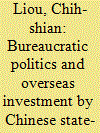

|
|
|
|
|
| Publication |
2009.
|
| Summary/Abstract |
From the state-centered perspective, China's hunt for foreign energy deals has generated increasing uneasiness in international relations. By exploring Chinese national oil companies' overseas expansion, this study finds that Chinese bureaucratic fragmentation in the context of the state's changing relationship with state-owned enterprises has greater impact on firms' offshore ventures than the state-centered perspective contends.
|
|
|
|
|
|
|
|
|
|
|
|
|
|
|
|
| 2 |
ID:
143424
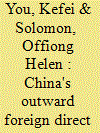

|
|
|
|
|
| Summary/Abstract |
In the past decade, China's outward foreign direct investment (FDI) has increased significantly. On the other hand, the Chinese economic growth model is heavily reliant on domestic investment. Our study examines the important issue of how China's domestic investment responds to its FDI outflows. We investigate this issue analyzing, for the first time, China's domestic investment at industrial level. We specifically account for the factor of government support given the significant role played by the state in the Chinese economy. Using industrial level data, we further evaluate whether domestic investment reacts to outward FDI differently between state dominated and non-state dominated industries. Our study adopts an accelerator model where the system-Generalized Method of Moments (GMM) is employed for our estimations. Our empirical results suggest that domestic investment responds positively to outward FDI in China, Furthermore, the FDI outflows influences domestic investment differently depending on the level of government support in the particular industries. Such influence is much stronger in state dominated industries than in the non-state dominated ones.
|
|
|
|
|
|
|
|
|
|
|
|
|
|
|
|
| 3 |
ID:
171891
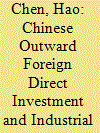

|
|
|
|
|
| Summary/Abstract |
This paper constructs a two‐sector model to identify the effects of outward foreign direct investment (OFDI) in different countries on China's industrial upgrading and conducts an empirical analysis using provincial‐level panel data from 2003–2015. The results show that China can benefit from industrial upgrading via OFDI in developed countries by way of reverse technology spillover. This effect is significant in the eastern region, but not in the central and western regions. China can also benefit from industrial upgrading via OFDI in developing countries and countries along the Belt and Road through marginal industrial transfer. This effect is more significant in the central region, followed by the western and eastern regions. Our results imply that China should promote technology‐seeking OFDI in developed countries, and enhance efficiency‐seeking OFDI in developing countries, especially in countries along the Belt and Road.
|
|
|
|
|
|
|
|
|
|
|
|
|
|
|
|
| 4 |
ID:
106014
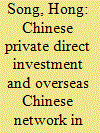

|
|
|
|
|
| Publication |
2011.
|
| Summary/Abstract |
Based on extensive interviews in China and in Africa over 2 years, the present paper investigates Chinese private direct investment in Africa. Drawing on the Swedish Uppsala model, we explore two mian issues. First, do Chinese private enterprises follow the linear mode to invest in Africa? Second, if not, how do they go out and develop their investments, and who helps them overcome the obstacles to investing in Africa? We find that very few Chinese private enterprises follow a linear internationalization process, and most depend on the local overseas Chinese network and other networks to facilitate their entry into the host market. The reason lies in that Chinese private enterprises are still at the early stage of internationalization. Entrepreneurship is one of the most important ownership advantages of Chinese private enterprises investing in Africa.
|
|
|
|
|
|
|
|
|
|
|
|
|
|
|
|
| 5 |
ID:
186490
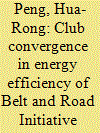

|
|
|
|
|
| Summary/Abstract |
Countries along with the Belt and Road Initiative (BRI) differ in geographical location, technological levels, and resource endowment. It is worth paying attention to the evolution of the gap in energy efficiency of BRI countries. Therefore, this study investigated club convergence in total-factor energy efficiency (TFEE) of BRI countries, and the role of China's outward foreign direct investment (OFDI) in TFEE convergence, by adopting panel data over 1996–2019. Results indicate that the TFEE of the BRI countries showed a trend of divergence as a whole, but converged to three convergence clubs with different characteristics of 1) high TFEE and convergence rates (20 countries); 2) middle TFEE and convergence rates (13 countries), 3) low TFEE and convergence rates (27 countries). We also found that China's OFDI in low-carbon industries in BRI countries contributed to the convergence of clubs with high energy efficiency and convergence rates. Moreover, China's OFDI in high-carbon industries showed a pollution halo effect, causing lower energy efficiency countries to converge to the high energy efficiency and convergence rate club.
|
|
|
|
|
|
|
|
|
|
|
|
|
|
|
|
| 6 |
ID:
178269
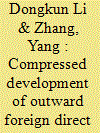

|
|
|
|
|
| Summary/Abstract |
Unlike the conventional understanding of China’s outward foreign direct investment, we found that the pattern of compressed development better reflects China’s outward foreign direct investment in the 21st century. The compressed development of Chinese outward foreign direct investment is characterized by a much higher growth rate than that of earlier industrializers and greater structural changes in types of investment, investors and destination countries. These changes result in new challenges to the Chinese government in dealing with domestic and foreign actors. Nevertheless, these challenges also create incentives for the Chinese government to improve how it interacts with Chinese investors and regulates their investment behavior.
|
|
|
|
|
|
|
|
|
|
|
|
|
|
|
|
| 7 |
ID:
175574


|
|
|
|
|
| Summary/Abstract |
This paper empirically investigates the impact of China's outward foreign direct investment (OFDI) on its export sophistication. Using a provincial‐level panel dataset and applying fixed effects and instrumental variable regression techniques, the study finds that, on average, OFDI has no significant impact on China's export sophistication. However, after the full sample is divided into different regions, the study finds that OFDI has a positive and significant impact on export sophistication in the developed coastal region, but no such impact is observed in the less developed inland regions. Further investigation using a panel threshold model reveals that only when GDP, per capita GDP, human capital, and the research and development intensity of a home economy reach a certain level can OFDI promote export sophistication. The findings suggest that accelerating eco nomic development and increasing absorptive capacity can facilitate the contribution of OFDI to China's export sophistication.
|
|
|
|
|
|
|
|
|
|
|
|
|
|
|
|
| 8 |
ID:
102718


|
|
|
|
|
| Publication |
2011.
|
| Summary/Abstract |
Are the internationalization strategies of China's private businesses different from those of state-owned businesses? To date, little systematic empirical research addresses this question, despite the now well-established arguments that market and institutional imperfections influence the outward foreign direct investment (ODI) of China's state sector MNEs. Why is so little known about private sector foreign direct investment? One important reason is that private companies have gone to considerable lengths to conceal their activities by using offshore holding companies in tax havens. This paper, using a sample of offshore listed companies that are privately controlled, investigates what we dub 'onward-journeying' - foreign direct investment undertaken via tax havens. In doing so it further explores the ODI strategies of some of China's most successful private companies.
|
|
|
|
|
|
|
|
|
|
|
|
|
|
|
|
| 9 |
ID:
175263
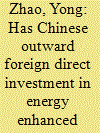

|
|
|
|
|
| Summary/Abstract |
China's soaring outward foreign direct investment (OFDI) in the energy sector has attracted increasing attention, which is arguably intended to enhance China's energy security given its large oil deficit. This study attempts to empirically examine whether OFDI in the energy sector can help to enhance China's energy security by conducting an econometric analysis using a micro-level dataset. The results show that China's OFDI in energy does enhance its energy security by increasing the volume of oil imports from host countries for the investment and by diversifying China's sources of imports. On average, a 1% increase in energy OFDI to a country leads to a 1.2% increase in the probability of importing from that country and a 0.071% increase in the firm-level import volume. In addition, we find that the effects do not differ by investment mode (i.e. mergers and acquisitions or greenfield investments) but do differ by country type, as investments in developing countries can positively contribute to oil imports, whereas investments in developed countries do not have the same effect.
|
|
|
|
|
|
|
|
|
|
|
|
|
|
|
|
| 10 |
ID:
160000
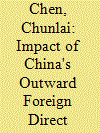

|
|
|
|
|
| Summary/Abstract |
This paper investigates the impact of China's outward foreign direct investment (OFDI) on its economic growth. By using a provincial‐level panel dataset and applying fixed‐effects and instrumental variable regression techniques, the study finds that both OFDI from provincial firms and OFDI from state‐owned enterprises have a positive impact on China's provincial economic growth. The positive impact of OFDI on provincial economic growth may be the result of reverse knowledge spillovers from OFDI to the home provincial economy through demonstration and imitation, labor movement, and backward and forward industrial linkages, thus increasing the productivity and the efficiency of home firms and promoting the growth of the home economy.
|
|
|
|
|
|
|
|
|
|
|
|
|
|
|
|
| 11 |
ID:
139544


|
|
|
|
|
| Summary/Abstract |
The growth of Chinese multinational enterprises (MNE) has stimulated great interest in their outward foreign direct investment (FDI) strategies, particularly among academics in business and management studies. To date, however, serious methodological shortcomings plague empirical studies in these disciplines. Specifically, the vital issue of how Chinese MNEs use and route FDI via tax havens and offshore financial centres is not adequately dealt with. These practices have created large geographical, industrial composition and volume biases in Chinese outward FDI data. Using a sample of 100 Chinese MNEs, we illustrate how the use of tax havens and offshore financial centres has created these biases, and examine the implications for understanding Chinese MNE activity.
|
|
|
|
|
|
|
|
|
|
|
|
|
|
|
|
| 12 |
ID:
161767
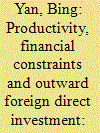

|
|
|
|
|
| Summary/Abstract |
This paper studies the relationship between the financial constraints and outward foreign direct investment (OFDI) of Chinese enterprises. First, we construct a theoretical model and develop a series of hypotheses to analyze how productivity and financial constraints influence firms' OFDI decisions. Then we construct a multivariate index to measure internal and external financial constraints. Using Chinese Industrial Enterprises Database as well as the Database of OFDI Firms in China, our empirical finds that both productivity and financial constraints have important impacts on firms' OFDI decisions. In addition, the marginal effect of the financial constraints increases as firms' productivity rises; an effect felt more to the private enterprises than state-owned enterprises. Empirical results also indicate that external financial constraints affect the firms' OFDI decisions more greatly than the internal financial constraints.
|
|
|
|
|
|
|
|
|
|
|
|
|
|
|
|
| 13 |
ID:
164724
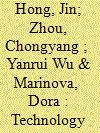

|
|
|
|
|
| Summary/Abstract |
This research adds to the literature studying the effects of outward foreign direct investment (OFDI) on domestic innovation performance and the moderating effect of a technology gap between host and home countries. New definitions of observed technology gap and expected technology gap are proposed. An observed technology gap captures the existing differences in technology level between establishments, regions or countries. An expected technology gap is an indication of the effort of imitating and learning from technology leaders. The corresponding measures and effects of observed and expected technology gaps on OFDI‐induced reverse technology spillover are analyzed. OFDI in developed countries promotes innovation performance. However, OFDI in emerging markets hampers innovation performance. It is also found that regions with a wider observed technology gap and a narrower expected technology gap can benefit more from OFDI.
|
|
|
|
|
|
|
|
|
|
|
|
|
|
|
|
| 14 |
ID:
114005
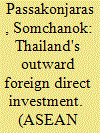

|
|
|
| 15 |
ID:
086206
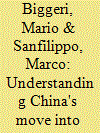

|
|
|
|
|
| Publication |
2009.
|
| Summary/Abstract |
An important new issue on the international scene is the upsurge in market and non-market South-South relations. The aim of this paper is to understand the dynamics that lie behind the recent Chinese move into Africa by empirically exploring the determinants of Sino-African relationships. In order to have a comprehensive picture, the analysis takes into consideration the main channels of commercial and political interactions: outward foreign direct investment (OFDI), trade and aid (international economic cooperation). The empirical analysis utilises a panel data set, from 1998 to 2005, for 43 African countries. The econometric estimates for three simultaneous equations are based on an instrumental variables method. Results show that the Chinese move into Africa is driven by strategic interaction among the three channels (FDI, trade and economic cooperation) as well as by pull factors, i.e. the characteristics of the receiving countries in terms of natural resource endowments and their market potential.
|
|
|
|
|
|
|
|
|
|
|
|
|
|
|
|
|
|
|
|
|